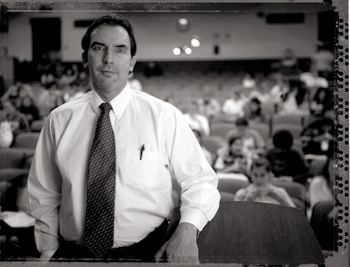In this essay, Dean Laude reflects on how the humanities helped shape his approach to life and the advice he now shares with students.
 I may have been a science major in college, but the freshman course I remember best at Sewanee was Religion 111 where I had to read Paul Tillich's "Dynamics of Faith," and with the help of my Harvard Divinity-trained professor was able to determine that my Catholic upbringing had gotten it all wrong.
I may have been a science major in college, but the freshman course I remember best at Sewanee was Religion 111 where I had to read Paul Tillich's "Dynamics of Faith," and with the help of my Harvard Divinity-trained professor was able to determine that my Catholic upbringing had gotten it all wrong.
God (or at least the version that could fit into my limited understanding of Tillich) didn’t exist.
Armed with this knowledge I spent my next year a lapsed Catholic before venturing into a philosophy course intending to cement my new-found lack of spirituality.
That same professor, who also taught me that the best teachers are innately contrarian, soon got me to think that maybe there was a God after all — still vivid is my memory of climbing the steps to his office for clarification and being told to go with what felt right. I headed back to church for good.
When I asked my friend English Professor Liz Scala for guidance on this essay she offered I should write about "Don Quixote," that there were some good parallels that I could draw from. Actually Don Quixote had been my own first thought when asked to write this essay, but in trying to connect with Cervantes I realized I had never been able to make it all the way through the book — as much as I wanted, it just never clicked for me.
Trying to think about what did resonate, the answer jumped out — Raskolnikov.
I remember coming home from college after my freshman year, and for some reason sat down with "Crime and Punishment," and as best I can recall, pretty much read it straight through in one sitting. Though to that point in my life I hadn’t done anything nearly as bad as a double homicide, Raskolnikov and I were soul mates charting lives grounded in struggle and redemption.
Anyone brought up Catholic knows what I am talking about.
Some three decades later as I reflect on my life, I realize that being raised by an Italian immigrant father offered little hope for escape from my religion, no matter how good a scientist I became.
These days when I watch a movie, what gets me every time is this absolutely irrational need to be confirmed by the likes of Robert De Niro doing penance for killing his brother by scaling the Iguazu Falls in "The Mission," or Robert Redford’s redemption as he crawled from his hospital bed to win the pennant in "The Natural."
When I am not teaching chemistry or being an administrator, I find myself several times a week in meetings with students, who when it comes right down to it, are always asking the same question: “Am I going to be OK?”
Efforts at comfort born of fact-laden rationalizations of study skills or medical school rankings rarely seem the right salve.
The more valuable advice I give is born from the contentment in knowing that the arc of my life does end happily — that whatever my failings along the way, there is something essentially human in my struggle, and with any grace, my redemption.
Yes, I am a scientist and imagine that my ability to draw on reason to explain the natural world will be my legacy at The University of Texas at Austin.
But when it comes right down to it, the way I will be remembered to those who sit with me was incubated in a couple of college religion and philosophy courses that were sandwiched around a weekend with Dostoevsky.
This essay is part of the KNOW series on the humanities.


















Comments